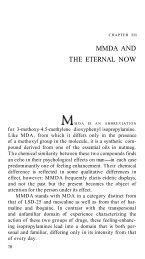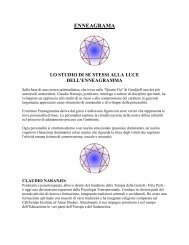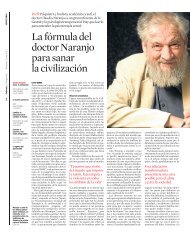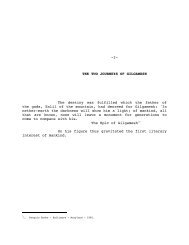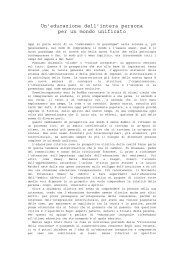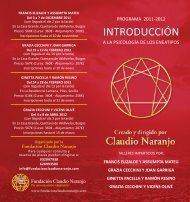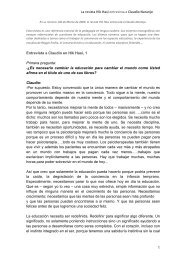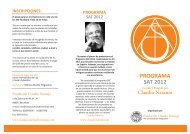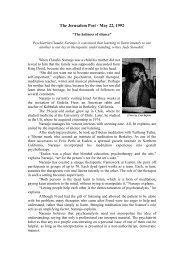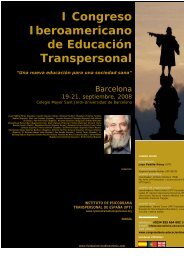Present – Centeredness in Gestalt Therapy Claudio Naranjo
Present – Centeredness in Gestalt Therapy Claudio Naranjo
Present – Centeredness in Gestalt Therapy Claudio Naranjo
Create successful ePaper yourself
Turn your PDF publications into a flip-book with our unique Google optimized e-Paper software.
objects of truly wise reflection, but are mostly just objects of day-dream<strong>in</strong>g and va<strong>in</strong> imag<strong>in</strong><strong>in</strong>gs which<br />
are the ma<strong>in</strong> foes of Right M<strong>in</strong>dfulness, Right Understand<strong>in</strong>g and Right Action as well. Bare Attention,<br />
keep<strong>in</strong>g faithfully to its post of observation, watches calmly and without attachment the unceas<strong>in</strong>g<br />
march of time; it waits quietly for the th<strong>in</strong>gs of the future to appear before its eyes, thus to turn <strong>in</strong>to<br />
present objects and to vanish aga<strong>in</strong> <strong>in</strong>to the past. How much energy has been wasted by useless<br />
thoughts of the past: by long<strong>in</strong>g idly for bygone days, by va<strong>in</strong> regrets and repentance, and by the<br />
senseless and garrulous repetition, <strong>in</strong> word or thought, of all the banalities of the past! Of equal futility<br />
is much of the thought given to the future: va<strong>in</strong> hopes, fantastic plans and empty dreams, ungrounded<br />
fears and useless worries. All this is aga<strong>in</strong> a cause of avoidable sorrow and disappo<strong>in</strong>tment which can be<br />
elim<strong>in</strong>ated by Bare Attention (Nyaponika Thera, 1962, p. 41).<br />
Past and future do not qualify as "bare objects" <strong>in</strong> that they are <strong>in</strong> the nature of imag<strong>in</strong><strong>in</strong>g, but are<br />
also to be avoided because dwell<strong>in</strong>g <strong>in</strong> them entails a loss of freedom: illusion ensnares us <strong>in</strong> its<br />
recurrence. As Nyaponika Thera (1962, p. 41) says:<br />
Right M<strong>in</strong>dfulness recovers for man the lost pearl of his freedom, snatch<strong>in</strong>g it from the jaws of the<br />
dragon Time. Right M<strong>in</strong>dfulness cuts man loose from the fetters of the past which he foolishly tries<br />
even to re<strong>in</strong>force by look<strong>in</strong>g back to it too frequently, with eyes of long<strong>in</strong>g, resentment or regret.<br />
Right M<strong>in</strong>dfulness stops man from cha<strong>in</strong><strong>in</strong>g himself even now, through the imag<strong>in</strong>ations of his fears and<br />
hopes, to anticipated events of the future. Thus Right M<strong>in</strong>dfulness restores to man a freedom that is to<br />
be found only <strong>in</strong> the present.<br />
The most important practice related to the view <strong>in</strong> the quotation above is that form of meditation<br />
the Ch<strong>in</strong>ese call we-hs<strong>in</strong> (or idealessness), which consists, as Watts (1950, p. 176) puts it, <strong>in</strong> the<br />
ability to reta<strong>in</strong> one's normal and everyday consciousness and at the same time let go of it.<br />
That is to say, one beg<strong>in</strong>s to take an objective view of the stream of thoughts, impressions, feel<strong>in</strong>gs,<br />
and experiences which constantly flows through the m<strong>in</strong>d. Instead of try<strong>in</strong>g to control and <strong>in</strong>terfere<br />
with it, once simply lets it flow as it pleases. But whereas consciousness normally lets itself be carried<br />
away by the flow, <strong>in</strong> this case the important th<strong>in</strong>g is to watch the flow without be<strong>in</strong>g carried away ...<br />
one simply accepts experiences as they come without <strong>in</strong>terfer<strong>in</strong>g with them on the one hand or<br />
identify<strong>in</strong>g oneself with them on the other. One does not judge them, form theories about them, try to<br />
control them, or attempt to change their nature <strong>in</strong> any way; one lets them be free to be just exactly<br />
what they are. "The perfect man," said Chuang tzu," employs his m<strong>in</strong>d as a mirror; it grasps noth<strong>in</strong>g, it<br />
refuses noth<strong>in</strong>g, it receives but does not keep." This must be quite clearly dist<strong>in</strong>guished from mere<br />
empty-m<strong>in</strong>dedness on the one hand, and from ord<strong>in</strong>ary undiscipl<strong>in</strong>ed m<strong>in</strong>d-wander<strong>in</strong>g on the other.<br />
The practice of attention to the present <strong>in</strong> the context of <strong>Gestalt</strong> therapy is very much like<br />
verbalized meditation. Moreover it is a meditation carried <strong>in</strong>to the <strong>in</strong>terpersonal situation as an act of<br />
self-disclosure. This permits a monitor<strong>in</strong>g of the exercise by the therapist (which may be<br />
<strong>in</strong>dispensable to the <strong>in</strong>experienced) and may also add significance to the contents of awareness.<br />
I would not doubt that the search for words and the act of report<strong>in</strong>g can <strong>in</strong>terfere with certa<strong>in</strong> states<br />
of m<strong>in</strong>d; yet the act of expression also adds to the exercise <strong>in</strong> awareness, beyond its be<strong>in</strong>g merely a<br />
means of <strong>in</strong>formation for the therapist's <strong>in</strong>tervention. At least the follow<strong>in</strong>g advantages of<br />
communicated awareness over silent meditation may be listed:<br />
1 - The act of expression is a challenge to the sharpness of awareness. It is not quite true to say<br />
that we know someth<strong>in</strong>g but cannot put it <strong>in</strong>to words. Of course, words are mere words and we can



